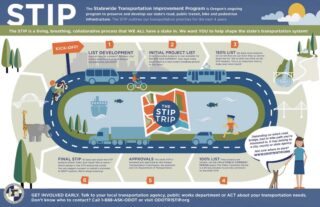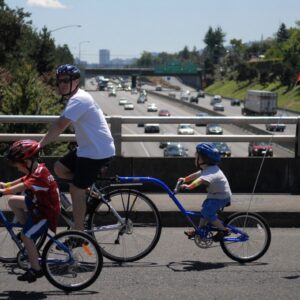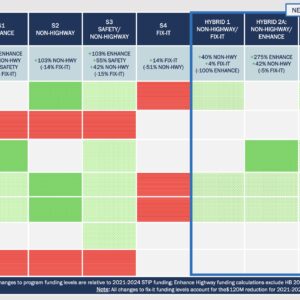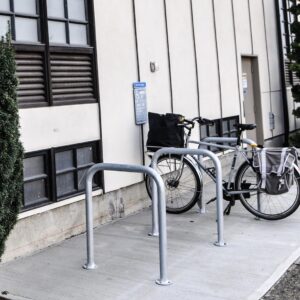
Thanks to a big effort by community organizers, Oregonians will now have a few more days to do their homework and take part in the most highly scrutinized STIP funding process in recent memory.
The STIP, or Statewide Transportation Improvement Program, is the Oregon Department of Transportation’s capital project list and it accounts for $2.2 billion in funding over a three-year period. The 2024-2027 STIP has gotten a lot of attention in part because it’s the first one ever where ODOT has been obligated to assess its impact on climate change and greenhouse gas emissions. At this point in the process, ODOT needs to come up with a general funding “scenario” and get it adopted by the five-member Oregon Transportation Commission. This scenario will serve as a road-map for future project spending. Put another way, it will tell ODOT how much it has to spend on highway expansion projects and bike paths.
ODOT staff have about $600 million in discretionary funds (out of the $2.2 billion total) to put into different funding scenarios.
After coming out with a scenario over the summer that would have pumped an unprecedented amount of money into the “Non-Highway” category (which does the most of the four main categories to fund cycling, walking, and transit infrastructure) and would have led to a significant impact on GHG emissions, ODOT changed the funding allocations at the last minute. That move led to a delayed vote earlier this month.
Advertisement
In the last week, Portland-based Bike Loud PDX and other advocacy groups have used the delay to increase awareness of the STIP process and get more people to share comments with the OTC. They’ve passed along well over 200 comments in the past two days as part of their “Stop the STIP” campaign.
The rescheduled OTC meeting was set for this Friday (12/11), but ODOT just shared a statement saying the meeting won’t happen until next Tuesday (12/15) at 5:00 pm. “The change in date is designed to accommodate the large number of people who have signed up to provide public comment at the meeting and allows commissioners to extend the deadline for written comment,” ODOT says.
The meeting will be held live via YouTube. You can share official public comment on the funding scenarios via OTCAdmin@odot.state.or.us through this Friday (12/11) at 5:00 pm. For more information, view the meeting materials on the OTC website.
— Jonathan Maus: (503) 706-8804, @jonathan_maus on Twitter and jonathan@bikeportland.org
— Get our headlines delivered to your inbox.
— Support this independent community media outlet with a one-time contribution or monthly subscription.







Thanks for reading.
BikePortland has served this community with independent community journalism since 2005. We rely on subscriptions from readers like you to survive. Your financial support is vital in keeping this valuable resource alive and well.
Please subscribe today to strengthen and expand our work.
Any idea what percentage of the comments submitted are in favor of the Non-Highway option? I guessing that it is the vast majority, but I am wondering how many people are really writing to the OTC about how much they love driving and want everyone else to drive too. Furthermore, with such overwhelming (assumed) support for the non-highway option, what justification does ODOT/OTC/Mrs. Brown use to dismiss the will of the public? That the Oregonians who really matter aren’t the ones submitting comments to the OTC?
Governor Brown.
Our local MPO just completed their metropolitan transportation plan. They had on online survey with 20 respondents, for which they made lots of charts showing support for certain new taxes and facilities. It turns out 16 of the respondents were government staff and other 4 were the usual advocates (in an MPO with over 300,000 residents).
One thing ODOT seems to be doing is pitting Fix-It (basic maintenance) against “Non-highway”. They tend to win on that argument, because it’s hard to argue against maintenance. But what are we maintaining? Mostly a ton of highways and bridges, many of which would no longer be needed in a less auto-oriented future. I would encourage advocates to tell ODOT they should do a comprehensive reassessment of maintenance needs, taking into account the option of slowly retiring assets that may no longer be needed or desired in the future.
I just copied/pasted/modified the template from https://bikeloudpdx.org/stop-the-stip/ in the letter to OTC. Easy.